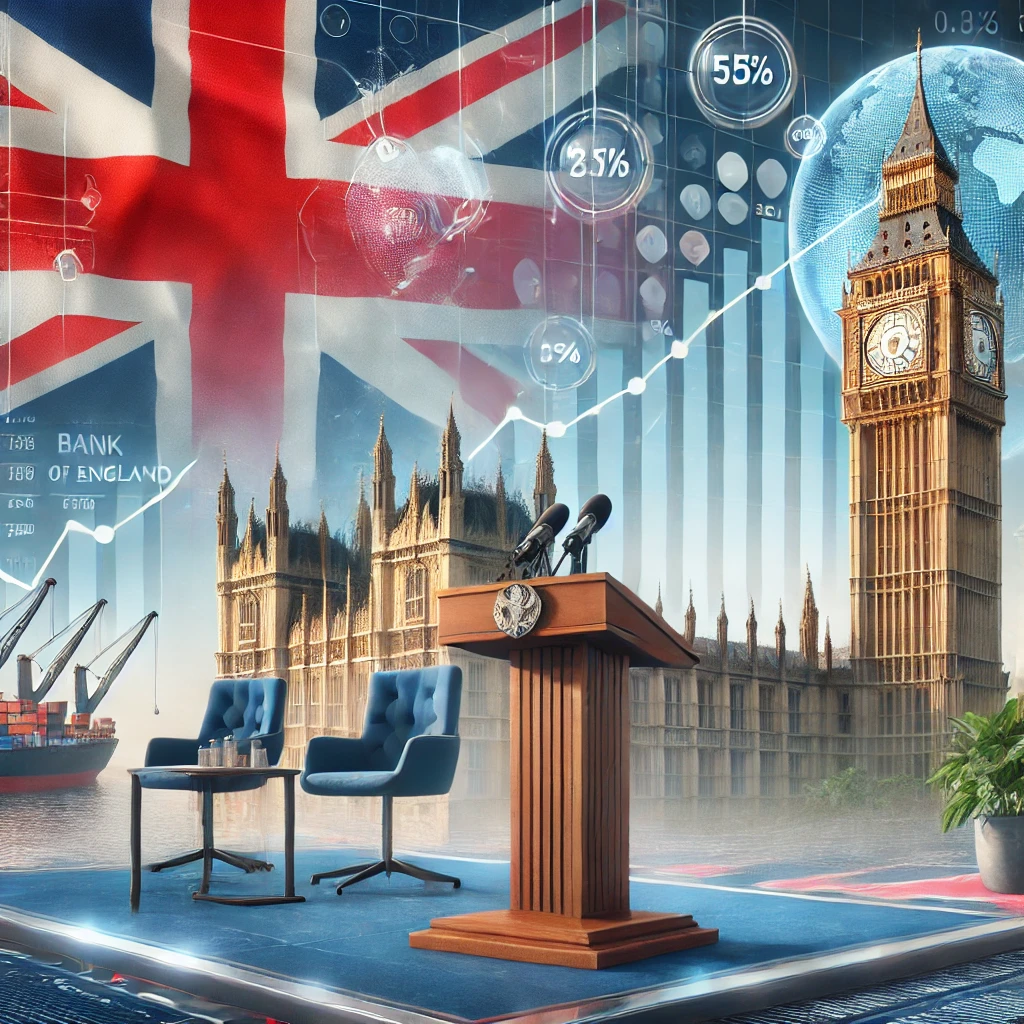Market News & Strategies 8th March 2025
The past week has been eventful for the UK, with major political shifts and economic challenges shaping the nation’s investment landscape. From high-level diplomatic meetings to market fluctuations, understanding these events is crucial for investors looking to navigate opportunities and risks effectively.
Table of Contents
Here’s a breakdown of the top 10 events and their potential impact on investment strategies.
Politics
1. Ukraine Summit in London Strengthens UK’s Global Stance
Prime Minister Keir Starmer hosted the 2025 London Summit on Ukraine, bringing together leaders from 18 nations to discuss military aid and diplomatic strategies. The UK reaffirmed its commitment to supporting Ukraine against Russian aggression, positioning itself as a leading voice in European security.
Investment Insight: Increased UK defense spending and potential supply chain disruptions may impact defense stocks and energy markets.
2. UK-Ireland Relations Enter a New Era
Starmer met with Irish Taoiseach Micheál Martin in Liverpool, marking a significant step towards closer UK-Ireland ties. The discussion focused on post-Brexit trade, border policies, and economic cooperation, signaling a fresh start in relations between the two nations.
Investment Insight: Strengthening trade relations may create new opportunities in sectors like logistics, agriculture, and financial services.
3. Reform UK Party Faces Leadership Crisis
The right-wing Reform UK Party faced internal chaos after MP Rupert Lowe was suspended for publicly criticizing Nigel Farage’s leadership. The fallout has sparked concerns over a potential split within the party, which has been gaining traction among disillusioned Conservative voters.
Investment Insight: Political instability can lead to market uncertainty, impacting investor confidence in UK equities.
4. Scottish Independence Back on the Table
The debate over Scottish independence has reignited, with SNP leader and First Minister Kate Forbes urging Westminster to allow another referendum. With support for independence fluctuating, this remains a contentious issue in UK politics.
Investment Insight: The potential for an independence referendum could create volatility in Scottish-based businesses, particularly in finance, energy, and property markets.
5. Conservative Leadership Speculation Grows
Former Prime Minister Rishi Sunak has been spotted reconnecting with influential Conservative donors, fueling speculation about his potential return to politics. With growing dissatisfaction over Labour’s economic policies, some Tories see Sunak as a strong contender to lead the party once again.
Investment Insight: If political sentiment shifts back toward conservative economic policies, investors may anticipate changes in tax policies, regulations, and interest rates.
Economy
6. Bank of England Warns Inflation Will Persist Until 2027
The Bank of England has warned that inflation will remain above 2% until at least 2027, making it unlikely that interest rates will be cut in the near future. This means homeowners and businesses will continue to face high borrowing costs, with no immediate relief in sight.
Investment Insight: High inflation and interest rates may continue to put pressure on real estate markets and consumer spending, while benefiting inflation-hedged assets like commodities and certain equities.
7. FTSE 100 Sees Biggest Drop in Months
The FTSE 100 index fell by 2%, marking its worst week since December 2024. Market analysts cite uncertainty over Donald Trump’s proposed trade tariffs as a key reason, which could disrupt UK exports and impact economic growth.
Investment Insight: Investors should monitor sectors most exposed to tariffs, such as manufacturing, automotive, and consumer goods, while considering safe-haven investments.
8. High Street Retailers Struggle as Store Closures Continue
Several major UK retailers, including Ann Summers, WHSmith, and New Look, have announced store closures due to declining foot traffic and rising costs. The retail sector continues to battle post-pandemic consumer habits and inflation-driven spending cuts.
Investment Insight: The ongoing retail downturn highlights the growing dominance of e-commerce and digital-first business models as potential investment opportunities.
9. UK-Japan Trade Talks Aim to Counter US Tariffs
As concerns over US trade policies grow, UK and Japanese ministers met in Tokyo to discuss strengthening trade relations. The UK is pushing for a rules-based international trade system to mitigate the negative impact of Trump’s proposed tariffs on key exports.
Investment Insight: Strengthened trade partnerships with Japan could benefit sectors like technology, pharmaceuticals, and financial services.
10. Cost of Living Crisis Continues to Bite
Despite slight improvements in wage growth, many UK households are still struggling with the high cost of energy and food. Reports indicate that consumers are cutting back on non-essential spending, putting further pressure on the retail and hospitality industries.
Investment Insight: Companies that cater to essential goods and services may see stronger demand, while discretionary spending sectors may face headwinds.
Final Thoughts
This week has highlighted the UK’s active role in global diplomacy, internal political tensions, and economic uncertainties that continue to shape investment opportunities and risks. With inflation still a pressing concern and global trade at a crossroads, the coming weeks will be crucial in determining market movements.
For investors, staying informed and adapting strategies based on political and economic shifts will be key to navigating these evolving market conditions.





